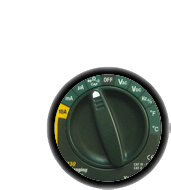- Continuity measurements
How to tell if two points are electrically connected - Resistance measurements
How to measure resistance - resistors, potentiometers and sensors - Voltage measurements
How to measure voltage - battery testing, wall-wart adaptor testing, and the terror of mixed AC/DC measurements.
Everyone always asks What multimeter should I get?
Well, since they're rather commodified (there are dozens of manufacturers) it is hard to make everyone use the same model, even though it would make things easier.
These are the necessities:
- Continuity testing with piezo buzzer
- Resistance test down to 10 ohm (or lower) and up to 1 Megaohm (or higher)
- DC voltage test down to 100mV (or lower) and up to 50V
- AC voltage test down to 1V and up to 400V (or 200V in the US/Canada/Japan)
- Diode testing
Here are nice things to have in your meter
- Auto-off - to keep from draining the batteries
- AC and DC current test, from 10mA to maybe 200mA and then also a 10A one as well
- Stand - a thing that flips out and keeps it upright on your table
- Auto-ranging - note: some people don't like auto-ranging because its slower and not as precise
- Hold - keep the maximum value on the screen so you can probe without looking at the meter.
- Common battery - such as 9V or AA's, pocket meters use hard-to-replace coin cells
These are things that I rarely (if ever) use, in decending order
- Frequency counter - before I had a scope this was surprisingly useful!
- Capacitance testing - usually to check random SMT caps
- Inductance testing - how often do you really use an inductor?
- Duty cycle - never used this
- Transistor beta meter - people don't really work with transistors anymore
- Temperature probe - I use the "Pease temperature test": a finger
I have a selection of suggested meters on this page, I strongly suggest the "better" (At $15 its a great value) or "best" ($50, autoranging, has a temp probe, all sorts of other junk) ones as the "good" one is really kinda bad. If you already have a multimeter then just use that one. I'll only be covering digital multimeters here so if you have an analog one, it may be a little different and you'll have to experiment to figure out what's up
A good multimeter will cost about $25. I suggest getting a ranging one , with current testing, and a wide range as well as easy-to-replace battery. You don't need to spend $200 on a Fluke 73! A $50 meter will be excellent. Auto-ranging meters may keep you from tripping up on ranges at first, but they're slower and often flakier.
I have had a Wavetek Meterman 27XT for half a dozen years and its been really good to me, but it was also about $80.
Here are many other links for learning how to use a multimeter
